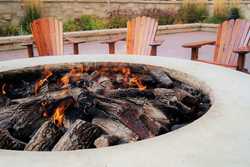Wine drinkers might be consuming less overall, but they’re opting for higher-quality bottles when they do choose to imbibe. Many of us are looking to cut down on our overall alcohol intake, so those few glasses of wine become more special.
After earning my WSET Level 2 Qualification in Wine, I knew I wanted to use that knowledge to be more intentional with my wine purchases. I see similar approaches in my social circles, with many friends studying up on their favorite grapes and seeking out wines made by innovative, thoughtful producers. Instead of mindless consumption, we’re putting our dollars towards elevated wines that we truly enjoy.
Of course, after taking the time to pick out a nice bottle or amass a special collection, it’s important to take proper care of it. In the case of wine, this means storing it in optimum conditions that protect the contents and allow it to age properly. Restaurants and bars have been keeping wine in temperature-controlled environments for decades, but now the average consumer is able to recreate these conditions at home with a wine fridge.
Remember: these aren’t the same as regular refrigerators. Wine fridges focus less on chilling and instead maintain a consistent cool temperature of around 55 F, which is recommended to best preserve the quality of the wine. They also create a consistent humidity level, ensuring the cork doesn’t dry out and oxidize the wine. Storing the bottles horizontally helps keep the cork damp as well. While you can make do with a standard bar cabinet and a regular fridge for open bottles, a wine fridge will protect your wines more thoroughly day-to-day and create a much more stable environment for special bottles that you’re laying down for a while.
Our top picks for best wine fridges
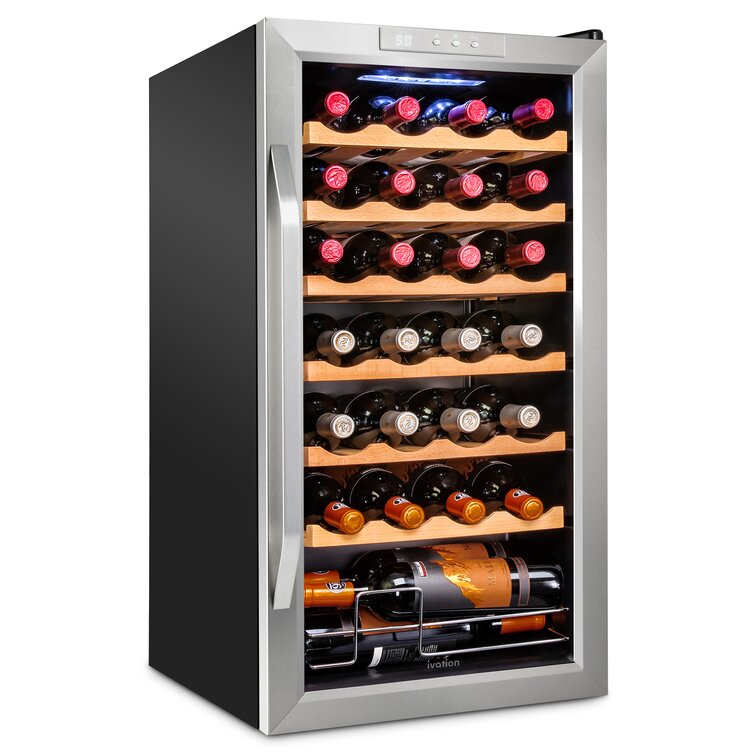
Ivation 28-Bottle Freestanding Wine Refrigerator
The Ivation 28-Bottle Freestanding Wine Refrigerator isn’t the cheapest fridge on this list, but it offers the greatest balance of storage space, performance, and accessibility. For under $400, you’ll be able to store 28 bottles of wine with energy-efficient compressor technology that ensures consistent temperature control.
There aren't dual temperature zones, but you can select any temperature between 41-64 F to suit the mix of wines you have. I appreciate that the seven display racks are adjustable, so you can easily fit larger bottles within the fridge, plus there’s a display rack for special bottles. The double-paned glass door helps with insulation and UV protection, while the soft LED lighting inside ensures good visibility even late into the evening. Depending on the size of your wine collection, this may be too small to accommodate every bottle, but some people may appreciate the narrower shape of the fridge if they have limited space at home. A nice bonus: There’s a lock for added security.
Specifications
- Dimensions: 16.9 x 17.7 x 33.1 inches
- Weight: 49.6 pounds
- Capacity: 28 Bottles
- Voltage: 120 V
- Installation type: Freestanding
- Warranty: 1 year
- Color: Black or Stainless Steel
- Price at publish: $329.99
Pros:
- Energy-efficient compressor technology ensures a consistent temperature
- Removable shelves and a display shelf make it easy to accommodate different bottles
- LED lighting and double-paned UV-resistant glass give clear visibility of your wines
- Nice price of under $400 for a mid-sized unit
Cons:
- No dual temperature zone setting
- 28-bottle capacity might be too small for some collectors
The bottom line:
If you don’t want to spend too much but have over two cases of wine to store, the Ivation 28-Bottle Freestanding Wine Refrigerator offers the best performance for the most reasonable price.
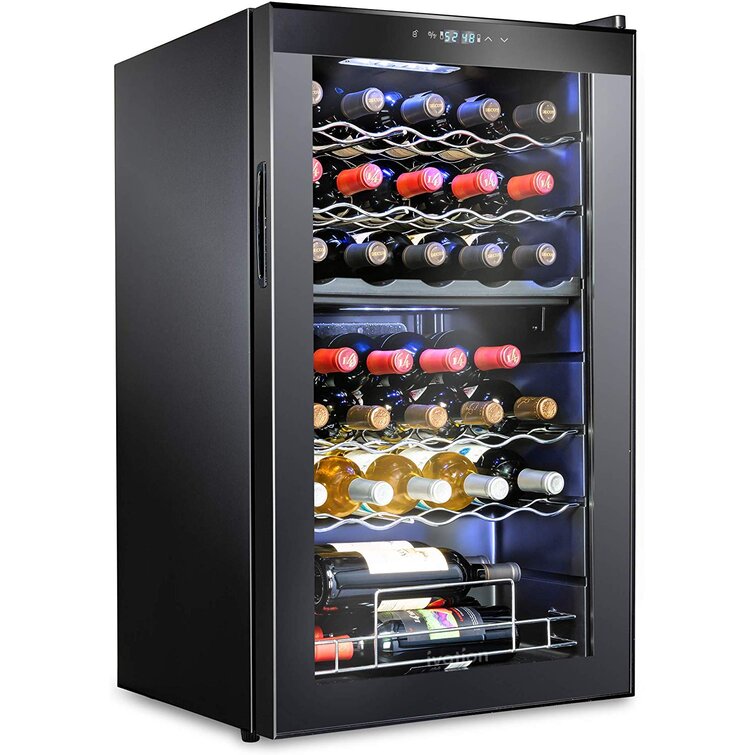
Ivation 33-Bottle Dual Zone Wine Cooler
The Ivation 33-Bottle Dual Zone Wine Cooler is a close competitor to my first pick on this list, the Wine Enthusiast 32-Bottle Dual Zone Fridge. They share very similar dimensions, prices, and aesthetics, with the Ivation cooler which also features UV-resistant glass, LED lighting, and a display shelf for special bottles. In fact, the Ivation model actually fits one more bottle and offers removable shelves, so you can adjust the storage to fit larger bottles.
The main differentiator is that Ivation’s wine fridge commits to the dual zone temperature system permanently, with the upper level supporting a range of 54-64 F and the lower level supporting 41-57 F. This fridge is ideal for anyone who drinks a mix of wines and wants to keep them all at optimum temperature—it may even have the edge on the Wine Enthusiast if you’re a big fan of sparkling wines. However, if you sometimes find yourself with a fridge full of entirely one type of wine, you may find this fixed dual system a little limiting. While it won’t harm any wine to keep it at 55 F, you won’t get the full benefit of the temperature range.
Specifications
- Dimensions: 19.4 x 16.9 x 33.4 inches
- Weight: 62 pounds
- Capacity: 33 bottles
- Voltage: 120 V
- Installation type: Freestanding
- Warranty: 1-year limited
- Color: Black with stainless steel trim
- Price at publish: $499.99
Pros:
- Nice mid-range size that accommodates a reasonable amount of wine
- Dual zone temperature system to better store different kinds of wine
- Removable shelves enable you to adjust the space to include larger bottles
- Vibration-free operating mode that helps to keep sediment undisrupted
Cons:
- Upper zone can’t be cooled lower than 54 F, so not suited for white-only drinkers
- Serious collectors may need more storage space
The bottom line:
The Ivation 33-Bottle Dual Zone Wine Cooler is a close rival to my ‘average wine-lover’ pick, with two dedicated zones that are perfect for storing both whites and reds at the ideal temperature.

Wine Enthusiast 32-Bottle Dual Zone MAX Compressor Wine Cooler
This Wine Enthusiast 32-Bottle Dual Zone Wine Cooler has a legion of fans and it’s easy to see why. It meets the needs of the vast majority of wine drinkers and does so in an elevated package that is high-quality yet not overly expensive. The dual zone capability allows you to maintain two separate temperatures, so you can keep whites and rosés chilled above, while reds enjoy a warmer environment below. This is ideal if you want to bring the wine to a particular temperature before serving; it’s recommended to keep the wine at 55 F for long-term storage. If you’re not looking to bring the wine to serving temperature, the fridge allows you to set a uniform temperature of anywhere between 41-64 F.
I like that there are bright LED lights inside, so bottle selection is a breeze. There’s even a display shelf that allows you to see labels through the UV-protected glass, which protects the wines from sun exposure. Wine Enthusiast uses compressor technology that is three times more energy efficient than comparable thermoelectric models while creating a consistently stable temperature, so you can be confident that your bottles are stored safely. The 32-bottle capacity is a nice size for more amateur or selective collectors, although those with large collections may find this model a bit too small. The only downside for me is that the fixed racks can’t fit larger bottles, be they magnums or sparkling wine, so you’ll need to use the display shelf for these.
Specifications
- Dimensions: 17 x 19.5 x 33.5 inches
- Weight: 60 pounds
- Capacity: 32 bottles
- Voltage: 115 V
- Installation type: Freestanding
- Warranty: 1-year parts and labor, 3-years sealed system
- Color: Black
- Price at publish: $499.00
Pros:
- Dual temperature zones so you can accommodate a mix of wines at optimum temp.
- Generous capacity of 32 bottles, without being too large for the average drinker to fill
- It’s 3x more energy efficient than comparable thermoelectric models
- The display shelf at the bottom lets you showcase your most special bottles
Cons:
- The 32-bottle capacity may not be sufficient for avid collectors
- The fixed racks don’t accommodate larger bottles
The bottom line:
With dual temperature zones, a display shelf, and an energy-efficient cooling system, the Wine Enthusiast 32-Bottle Dual Zone Fridge is a perfect mid-size for most collections.

Kalamera 12-Bottle Cooler Mini Fridge
It’s not only the giant wine collections that are worth storing properly. If you only tend to keep a case of wine on hand at a time or are looking for a smaller fridge that will fit into a narrow space, then I’d recommend the Kalamera 12-Bottle Cooler Mini Fridge. Despite its small size—it’s only 10 inches wide—I was drawn to the fact that this fridge still deploys compressor technology, which means the internal temperature is stable and reliable. The glass door is made with UV-resistant glass, as with larger models, and there is interior LED lighting for improved visibility.
The smaller capacity means that you may not want to use the limited space for large bottles, but the shelves are removable should you need to store a bottle of champagne for something special. If you live with younger people or roommates, then the digital lock may be particularly valuable! Overall, this fridge feels high quality despite its size and low price of just over $200. Of course, not everyone is going to want a smaller model like this, but for the right audience it will get the job done in style.
Specifications
- Dimensions: 17.7 x 9.9 x 31.2 inches
- Weight: 45 pounds
- Capacity: 12 bottles
- Voltage: 100-120 V
- Installation type: Freestanding
- Warranty: N/A
- Color: Black with a stainless steel trim
- Price at publish: $209.92
Pros:
- Nice low price but still includes compressor technology for stable temperature control
- Very slim profile that fits into small spaces and still accommodates a case of wine
- UV-resistant glass and interior LED lighting keep bottles protected but visible
- The digital lock keeps your collection secure—great for wine lovers with kids
Cons:
- The bottom two shelves are angled upright, which isn’t optimum for long-term storage
- A very small capacity makes this appropriate for only specific use cases
The bottom line:
If you have limited space or a smaller collection to house, the Kalamera 12-Bottle Cooler Mini Fridge offers powerful compressor cooling in a sleek, narrow design for just over $200.
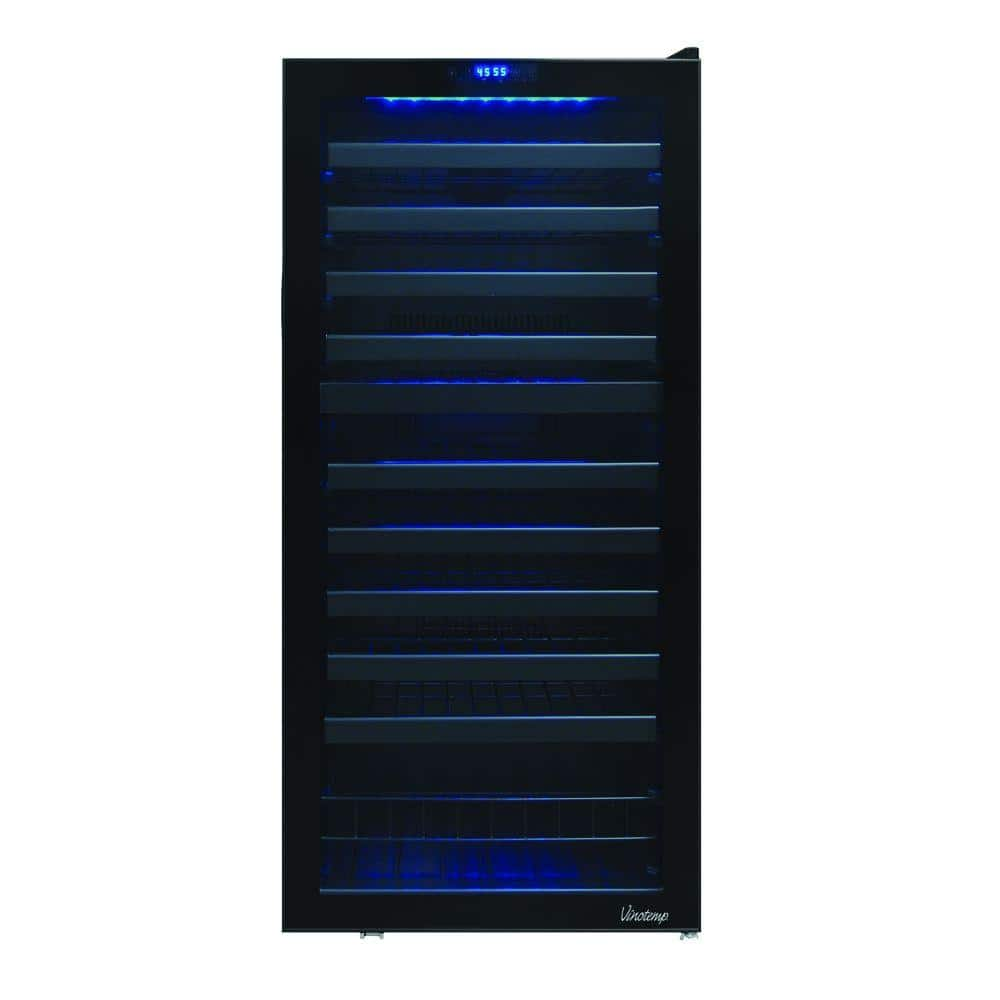
VinoTemp 110-Bottle Dual Zone Wine Cooler
On the other end of the spectrum, we have the avid wine collectors with several cases to put away. For those shoppers, I recommend the VinoTemp 110-bottle Dual Zone Wine Cooler. That’s right, 110 bottles. Unsurprisingly, this is a very large unit that weighs 139 pounds, so you’ll need to find sufficient space in your home to accommodate it. If you do have the space and the collection to fill it, I think you’ll enjoy the sleek design, which features a recessed handle, an all-glass facade, and atmospheric internal blue LED lights for illumination.
There are two temperature zones, one supporting 44 bottles and the other 66, so you can store various types of wine in their optimum conditions. Compressor technology creates reliable internal temperatures and there’s a security lock, so you can be confident your vast collection is in safe hands. The blue glow might not be to everyone’s tastes and you’ll pay just under $1,300 for this fridge, but that’s to be expected with any wine cooler of this size. If anything, this is one of the more affordable large-scale fridges, yet it still feels very high end.
Specifications
- Dimensions: 26.8 x 23.5 x 51.7 inches
- Weight: 139 pounds
- Capacity: 110 bottles
- Voltage: N/A
- Installation type: Freestanding
- Warranty: 90-day limited
- Color: Black
- Price at publish: $1,699.99
Pros:
- Incredibly large capacity of 110 bottles, ideal for large collections
- Dual-zone technology supports two different temperature zones inside the fridge
- Security lock and UV-resistant glass keep contents safe and protected from sunlight
- Sleek design includes a recessed handle and an all-glass facade, which looks expensive
Cons:
- Very large and heavy, with a large footprint, so not suited to smaller spaces
- Interior LED lights are blue, which may not be to everyone’s aesthetic tastes
The bottom line:
Vast wine collections will find a safe home in the VinoTemp 110-Bottle Dual Zone Wine Cooler, which keeps wine chilled in dual temperature zones for optimum large-scale storage.
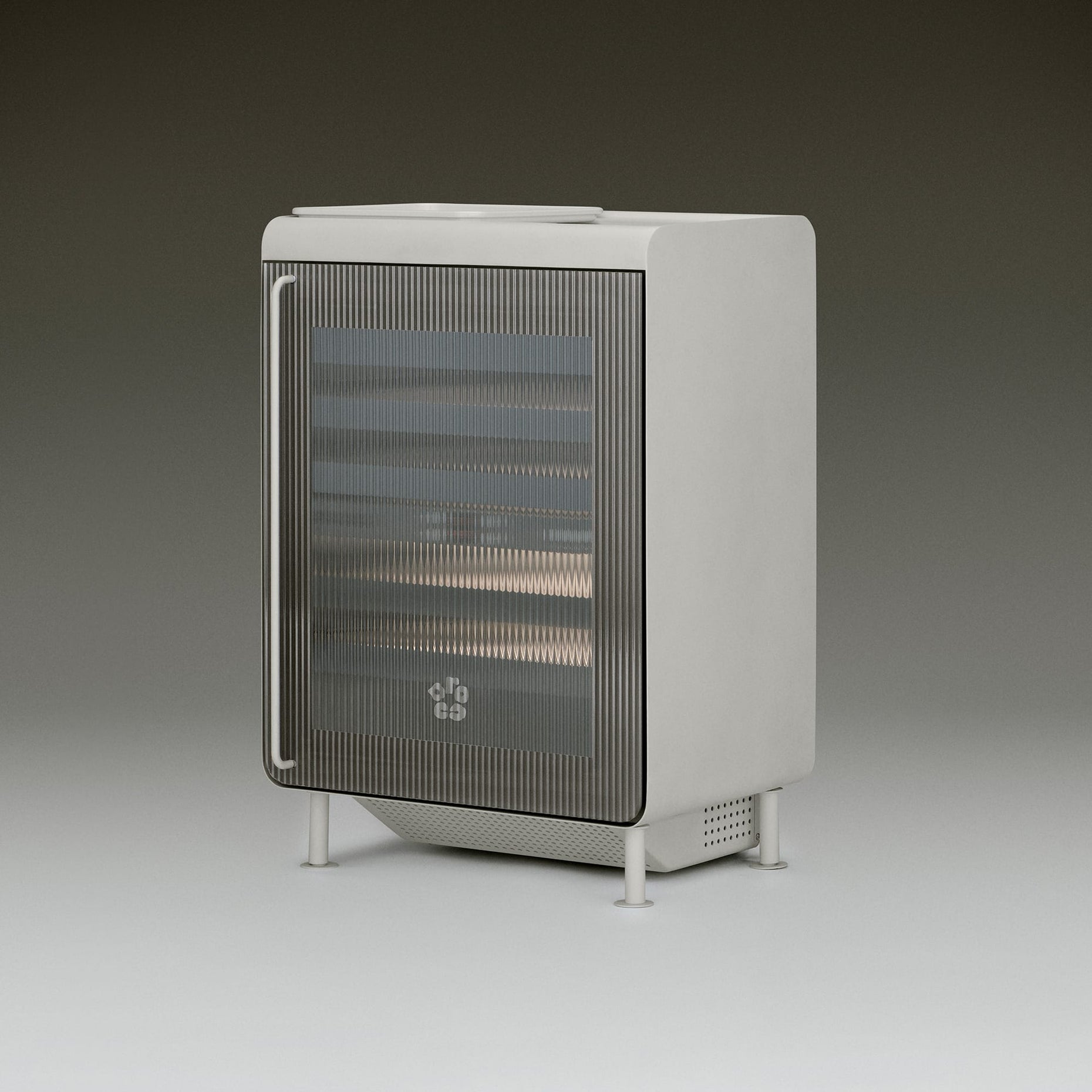
The Rocco Super Smart Fridge
The majority of wine fridges look exactly the same: block-shaped with black or steel coloring and a clear glass door. That’s why the Rocco Super Smart Fridge is such a breath of fresh air, with its retro reeded glass door (which still protects wine from harmful UV rays), short front legs reminiscent of mid-century modern design, and wider color range, including a vibrant yellow.
The interior design is also slick, featuring six modular shelves and racks that can be oriented for your preferred storage. The Rocco fridge is not just for wine but for all chillable beverages, which is why this is the only model on this list that cools down to 37 F. However, should you use this fridge for both wine and cans, you can deploy the dual temperature system to maintain two different climates at once.
Now, this is an expensive fridge, especially when you consider it can only accommodate 27 bottles of wine—or 88 standard-sized cans. However, if you’re someone who cares about the look of your wine fridge, this product really does stand apart. And as someone with limited space at home, I especially like that the top doubles as a bar cart—this product truly lets you entertain in style.
Specifications
- Dimensions: 16 x 24 x 34.5 inches
- Weight: 128 pounds
- Capacity: 27 bottles
- Voltage: N/A
- Installation type: Freestanding or can be used undercounter
- Warranty: 10-year warranty and 30-day risk-free trial
- Color: White, Yellow, or Graphite
- Price at publish: $1,295
Pros:
- Durable yet stylish design, with a trendy but practical reeded glass front
- Can support much lower temperatures than other fridges on this list
- Dual zone technology to accommodate both wine and canned beverages
- Reversible racks and modular shelves support versatile storage options
- The top of the unit doubles as a bar, which is great for smaller spaces
Cons:
- Expensive for the capacity level, which will be too low for serious wine collectors
- Very heavy for its size, therefore install may be difficult
The bottom line:
The Rocco Super Smart Fridge offers advanced cooling technology, a very trendy design, and dual temperature zones that support both wine and other drinks, but you’ll pay for the privilege.

Wine Enthusiast VinoView 28-Bottle Wine Fridge
Every bottle of wine deserves to be stored in optimum conditions, but there are some bottles that hold a special place in our hearts. These could be rare and premium wines or simply wines that hold a personal significance—whatever the reason, you’re proud of your collection and you want to show it off! If this sounds like you, then the Wine Enthusiast VinoView 28-Bottle Wine Fridge is a great way to do so. The fridge uses the brand’s premium compressor technology to create a reliable cool environment, with UV-resistant glass and a fair price of just under $400 for 28 bottles’ worth of capacity.
What sets it apart from other fridges, however, is its unique storage orientation that allows multiple bottles to be stored horizontally with the labels in prime view. Soft LED lighting ensures that you can always enjoy the sight of your bottles and that they’ll be perfectly illuminated for any guests. This fridge doesn’t support dual zone technology, and the capacity is a little low for serious wine enthusiasts, but this makes it a great option for a subsection of your collection that you want to showcase, not just store.
Specifications
- Dimensions: 17 x 18.9 x 32.7 inches
- Weight: 70 pounds
- Capacity: 28 bottles
- Voltage: 115 V
- Installation type: Freestanding
- Warranty: 1-year parts and labor, 3-years sealed system (parts only)
- Color: Matte Black
- Price at publish: $399
Pros:
- Nice price for a mid-level amount of storage, ideal for the average drinker
- Storage orientation allows most bottles to be stored with their labels pointing outward
- LED lighting illuminates labels, while double-paned glass protects wines from UV rays
- Wine Enthusiast’s signature compressor technology keeps temperature consistent
Cons:
- No dual zone temperature technology
- Smaller capacity won’t work for all wine collectors
The bottom line:
The Wine Enthusiast VinoView 28-Bottle Wine Fridge is a high performer from the brand that is a great choice if you’d rather showcase your favorite wines than store an extra couple of bottles.
EuroCave La Première S Wine Cellar

EuroCave La Première S Wine Cellar
While every wine fridge on this list will get the job done of keeping your wines at optimum temperature, the EuroCave La Première S Wine Cellar offers a superlative experience. Yes, it costs much more than even the second-most expensive product on this list, but you’re paying for handcrafted, premium materials, and truly innovative design.
EuroCave is the only wine cellar that uses both heating and cooling technology, a circulation fan, and a humidity cassette to achieve a consistent environment at all times throughout the fridge. Doors are vacuum-sealed and dual-paned, while LED lighting is soft, and air is treated with a charcoal filter to remove any odors that could taint the wine.
Even the shelving has been carefully designed to accommodate a range of storage orientations: sideways, longways, horizontal, or vertical. This larger unit can store 50 bottles with the three shelves in place or as many as 98 with the shelves removed. You’ll need a larger area to fit this wine cellar, but at purchase, you can customize your fridge to have door hinges on the right or left side to better suit your space. Pretty much the only thing you won’t get is dual zone technology, but the temperature system is so advanced that I feel confident every bottle you store in here will be protected.
Specifications
- Dimensions: 28.3 x 26.8 x 37.8 inches
- Weight: 149.9 pounds
- Capacity: 50 with three shelves in place, 98 without shelving
- Voltage: 115 V
- Installation type: Freestanding
- Warranty: 1-year parts and labor, 5-years sealed system (parts only)
- Color: Black
- Price at publish: $1,995-$2,095 (depends on door style and hinge side)
Pros:
- Large capacity of 50 bottles with shelves and 98 without shelving in place
- Purchases can be customized with solid or glass doors and right or left hinges
- Advanced heating and cooling technology plus vacuum-sealed doors for stable temperatures
- Hand-crafted in France from premium materials for a luxurious result
- Shelving is designed with recesses that accommodate various storage orientations
Cons:
- The most expensive option on this list
- No dual-zone heating
The bottom line:
For the ultimate in wine cooling craftsmanship, invest in the EuroCave La Première S Wine Cellar and benefit from superior temperature control, versatile shelving, and premium design.
How we selected the best wine fridges
The best wine fridge for you will depend heavily on the size of your collection and your available space. What may work fantastically for someone else could be far from practical for you, so it was important to represent a range of different wine enthusiasts with these picks. However, there is always a set of criteria that all the fridges have to measure up against:
Efficient cooling and temperature control
Ultimately, most people are investing in a wine fridge so they can achieve better temperature control than they can with a standard bar cart or refrigerator. With that in mind, I looked for wine fridges that utilized compressor technology, as this protects the interior from outside temperature fluctuations and creates a more stable internal climate. If a fridge had vacuum sealed doors, this was an added benefit. I assessed the temperature range available for each fridge, with bonus points going to systems with a particularly wide range or a dual zone system that could support two climates at once.
Flexible storage capacity
While not everyone needs to be able to store hundreds of bottles of wine, the ability to customize storage and accommodate different wine types is valuable for many wine collectors. Sparkling wines require thicker, larger glass bottles which won’t fit into the classic wine groove, so I checked if the fridges featured adjustable shelves or additional storage shelves that fit these bottles. I also looked at whether the fridges include display shelves or other unique organization features, which can enhance the user experience. If the shelves were wood, this earned bonus points, as wood tends to be gentler on labels.
Value for money
All of the fridges on this list cost at least a couple of hundred dollars, but it is still possible to find models that are a better value than others. I considered the ratio between price and bottle capacity, with fridges becoming better value if they offered more storage capacity per dollar. I also looked at whether the product had any added features that might improve the user experience, such as dual zone temperature control, flexible shelving, or an attractive aesthetic. Lastly, I factored in the quality of craftsmanship and the brand behind the fridge; beloved brands like Wine Enthusiast and EuroCave are loved for their long-term performance.
Care and maintenance
On a day-to-day basis, you shouldn’t need to do much to keep your wine cellar working efficiently. Vacuum the exterior as you would other appliances, just to ensure that no debris gets into any of the external components. Check to see if the power cord has been damaged and verify that it’s securely plugged in. Wipe down the sealing strip and ensure the seal is still holding firm. This should be sufficient for the healthy running of the appliance.
For long-term care, it’s good to do an annual overhaul of your unit and ensure it’s in good working condition. Once a year, empty your wine fridge and be sure to wipe down the inside and rid the interior of any dust particles or debris; they often cling to the surfaces of bottles and can become lodged over time. Use a gentle cleaning solution, such as warm water and vinegar, to clean the inside surfaces—including the shelving racks. Let these dry thoroughly before returning them to their place. You can now restock the cabinet with wine bottles.
What to consider when buying a wine fridge
Bottle capacity
One of the most clear differentiators between wine fridges is their capacity. Very casual wine drinkers may only keep a few bottles on hand at home and may prefer a smaller unit that they can keep stocked with 8 to 12 bottles. These also take up less space, adding to their practicality for the everyday consumer.
Collectors, industry professionals, or frequent hosts may gravitate towards larger wine coolers that can accommodate multiple cases of wine so they always have room for a new purchase or specialty bottle. The average person will likely be comfortable with a wine fridge that fits a bottle range of 28 to 36. If in doubt, take some time to calculate how many bottles you tend to keep on hand (and how that might change with the optimum storage conditions.) This is because it’s more energy efficient to maintain the temperature in a full wine fridge than a half-empty one, so you don’t want to overestimate and then find yourself wasting energy on cooling empty space.
Budget
Wine can be an expensive interest, but there is a great range in bottle prices even within the premium sector. This pricing approach extends to wine fridges as well. While you’re likely going to spend at least a couple hundred dollars on a small, yet well-made, fridge, it’s possible to spend thousands on a state-of-the-art wine cooler, especially if you’re looking to accommodate a large collection of bottles. It’s important to recognize that you’re buying a large appliance and therefore, there is a minimum cost for this service, but also that you don’t need to overpay for unnecessary design features. Even with a moderate budget, there are options on this list that will keep your wine in perfect condition.
Specialty design
All wine fridges should maintain a consistently cool temperature and store bottles in a horizontal orientation, but beyond that, you’ll find a lot of variety in design. If you mostly drink a single type of wine, then you’ll likely just need a single temperature unit. However, if you enjoy a range of wine types, then you might want to look for a wine fridge with dual zones that can be set to different temperatures; red wine should be kept at a higher temperature than white wine before serving.
If you keep sparkling wine, then you might need to look for a fridge with adjustable shelves that can accommodate their larger bottles. If you’re a collector of specialty bottles, you might prefer a wine fridge that will allow you to showcase labels through the glass. Some wine fridges allow for easy access to every shelf, while others may require you to move bottles about to get to the back storage; this might be fine if you buy by the case but less practical if you tend to buy individual bottles. You should also verify whether the wine fridge is freestanding or a built-in unit so you can install it correctly.
Frequently asked questions (FAQs)
Is it worth getting a wine fridge?
If you are someone who enjoys wine, collects wine, or loves to host people and serve them wine, then you are likely to benefit from buying a wine fridge. Even more casual drinkers may find the investment worthwhile, as long as they have the space to accommodate it. This is because a wine fridge is able to create and maintain the ideal conditions for wine, from temperature level to humidity to light filtration. Home refrigerators are usually too cold for optimum wine storage, while bar cabinets are not sealed and therefore don’t maintain a consistent temperature year-round. If wine isn’t stored in the right environment, it can spoil and become undrinkable. Therefore, anyone who cares about the condition of their wine should find a wine fridge worth it.
How long does wine last in the fridge?
Wine kept in a wine fridge set to optimum conditions can age comfortably for years, even decades. Many wines are recommended for aging, as the qualities of the wine change and develop in interesting, pleasant ways. Other wines are not as well-suited to aging, no matter the conditions they are stored in. As a general rule, reds are more likely to age well than whites, with the most suitable wines being ones that have a full body, high tannins, and high acidity. It’s always best to check in advance whether your particular bottle will benefit from being stored for a few years or if it’s better to drink it young. Regardless, you can be confident that most bottles will be absolutely fine if left for a year or two and may even improve in complexity and taste.
How long does open wine last in the fridge?
Once opened, it is recommended that a bottle of wine be finished within one to three days. Depending on how well the bottle is sealed after the initial opening, it may be stored with minimal disruption to the aromas or taste during those initial days, but eventually, the exposure to air will negatively affect the wine. You can prolong the storage window by using a professional vacuum sealer on the open bottle; if you don’t have one, you can return the cork to the bottle or screw the cap back on if it’s a screw-top. Never return a fully open bottle to the fridge, as it will spoil quickly and could spill.
What temperature should a wine fridge be?
Most wine fridges allow you to set the temperature anywhere between 41-64 F, so you can choose the heat level you prefer. It is generally recommended that you store wine at 55 F as this helps to preserve the quality of the wine without the risk of heat damage or freezing. If you detect that your particular unit runs a little hot or cold, you can adjust the temperature accordingly. Once you want to serve the wine, you may want to change the settings again—especially if you have a dual zone wine fridge. White wines are usually served at a cooler recommended temperature of between 46-54 F, while reds suit a slightly warmer temperature of 54-64 F. Sparkling should be served the coldest, at around 43-45 F.
How long does it take to chill wine in the fridge?
If you keep your wines at the recommended temperature of 55F, it shouldn’t take too long to bring the wine to the optimum serving temperature—perhaps an hour or so. However, if you are planning to serve a bottle that is currently at room temperature, you should allow around 2.5 hours in the wine fridge for a red wine to reach serving temperature, while a white wine should take around 3 hours.
How much should I spend on a wine fridge?
This will greatly depend on the size of your collection and whether you require any special features. Larger bottle capacities tend to come at a higher price, so expect to spend more if you have a lot of bottles to store. Dual zone temperature zones or advanced heating and cooling systems may cost more, while elevated design and craftsmanship are likely to come at a premium. While you should expect to spend at least a few hundred dollars, you won’t need to spend much more than $500 unless you have a very large collection or are looking to invest in something particularly luxurious and special.
What is the lifespan of a wine fridge?
The average lifespan of a wine fridge is between 10 to 15 years. You can improve the longevity of your product by taking good care of it during the day-to-day and then doing an annual maintenance check and deep clean. Be sure to check your owner’s manual for any specific care guidelines to keep your appliance running smoothly.









